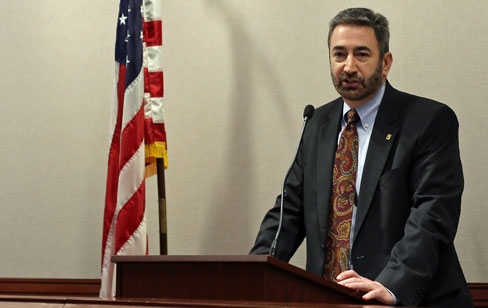Nonprofits: We Can Save Taxpayers $1.3 Billion

Shifting more state-run services to community-based nonprofit providers could save Connecticut taxpayers at least $1.3 billion over the next five years.
With billion dollar-plus budget deficits forecast in each of the two next fiscal years, the Connecticut Community Nonprofit Alliance said the state could reap significant savings by partnering more with the private sector.

Oak Hill president Barry Simon estimates $169,000 annual savings for each client transferred to private care. Photo: CT NewsJunkie.
“Community-based providers have been struggling to operate with inadequate funding for more than a decade, at a time when the need for services has only increased,” alliance chairman Peter DeBiasi said at a Jan. 18 press conference.
“Human service programs provided in the community are of equal or of higher quality provided by the state and they are less expensive.
“The Governor and legislature can protect these vital, life-saving services by embracing structural change.”
CBIA Economist Pete Gioia said that given the state’s budget situation, everything must be considered.
“It’s important as we address this fiscal crisis that we embrace new ideas and not continue on with business as usual,” Gioia said.
“These suggestions from the nonprofit alliance demand serious consideration and discussion.”
Chance to Work on Common Goal
State Rep. Catherine Abercrombie (D-Meriden) was hopeful her colleagues would be willing to listen to the alliance and read the results of a survey it did of its members on the potential impact of state budget cuts.
“This is a great opportunity for all of us to work on a common goal,” Abercrombie said.
“We know that the future of Connecticut is at stake here…. Everything has to be on the table. We all have to be partners in this together.”
Alliance executive director Gian-Carl Casa said the industry is not pushing for tax increases in the next state budget.
“We think that, right now, the solution is to do conversions” to nonprofit care providers, he said. “We’re getting encouraging support from both sides of the aisle.”
The nonprofit alliance estimates $169,000 annual savings for each client transferred to private care.
Unions representing state workers who serve the developmentally disabled and others have sued the state, alleging it failed to negotiate before closing group homes and laying off workers last year. The suit is pending.
“This should not be made into a union issue,” said Barry Simon, president of Oak Hill, a Hartford nonprofit that serves the disabled.
“We have the same union. Our staff are amazing people who do really amazing work.”
DeBiasi, president of Access Community Action Agency in Windham, said the alliance has over 500 members with more than 50,000 employees serving more than 500,000 state residents.
Protecting Services, Saving Jobs
Simon said the state could save $1.1 billion over the next three years by transferring roughly 1,600 clients into private-sector care. He estimates $169,000 annual savings for each client transferred to private care.
The state could save another $225 million over three years, he said, by shifting care for nearly 14,000 mentally ill adults to community-based providers.
Noting that Governor Malloy asked agency heads to cut 10% from the current budget, a survey of alliance members showed those cuts would force widespread layoffs and wage freezes, while cutting client services.
That would hurt Connecticut communities by providing fewer services to some of the neediest people. And that could lead to increased homelessness, emergency room visits, arrests, and incarcerations, survey respondents said.
It’s absolutely the wrong time to raise taxes. People are very concerned about Connecticut's affordability.
The alliance's call for greater partnership with the state was made a day after another advocacy group released a report urging major tax hikes to address projected budget deficits.
The New Haven-based Connecticut Voices for Children outlined various options for tax hikes totaling $3 billion, including higher income and capital gains taxes, replacing the corporate income tax with a value-added tax, and sales taxes on services and digital downloads.
CBIA president and CEO Joe Brennan said tax hikes will have a chilling effect on a business community already wary of adding jobs or expanding largely because of major tax increases in 2011 and 2015.
“We just think it’s absolutely the wrong time to be raising taxes,” Brennan said.
“What we keep hearing and reading is people are very concerned about the unaffordability of Connecticut.”
For more information, contact CBIA’s Pete Gioia (860.244.1945) | @CTEconomist.
RELATED
EXPLORE BY CATEGORY
Stay Connected with CBIA News Digests
The latest news and information delivered directly to your inbox.


